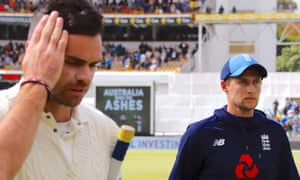
A stock of explanations and excuses is a valuable bit of any cricketer’s kit and should be kept ready, stashed by bat, box, and pads. “The sun was in my eyes. I couldn’t pick it up in this light. My foot slipped. Somebody was moving behind the sightscreen.”
England, who, after all, have had no shortage of practice at this, have used some particularly ripe examples over the years. Ian Botham blamed the rain that ruined their chances in a group match against Pakistan at the 1992 World Cup on the team chaplain, Andrew Wingfield Digby “You’re useless, you are,” Botham told him, “It’s not surprising there’s a worldwide movement in favour of Islam.”
That was when Ted Dexter was the chair of selectors. Dexter, who once explained away his late arrival for pre-season at Sussex by saying “I was fascinated by an adorable girl”, had a fine line in alibis himself. When England were thrashed in Caluctta in 1993, he announced he was going “to commission a report into pollution levels in Indian cities” (India’s environment minister replied that Dexter should “commission a report into the effect of pollution levels on the trajectories of India’s spinners” instead). And when England lost the Ashes in 1989 Dexter offered the deathless: “Venus may be in the wrong juxtaposition to somewhere else.”
Dexter had a rare flair for the form, though. These days (if not always) a lot of the explanations, excuses, and arguments about what went wrong are starting to sound tired and familiar. As if English cricket was turning circles while it tries to find the way ahead. On the one hand there are the pundits offering old bromides about a weak county game that fails to produce the particular cricketers the national team needs, and on the other, there are county fans who bounce the blame back on to the ECB’s mismanagement of the sport and their coaching set-up at junior and elite levels.
This winter the focus is on fast bowlers, because England’s batsmen have been skinned by three of them. Steve Finn touched on the issues when he was doing some charity work for Chance to Shine last week. He picked out the pitches, which are “a bit of a pancake because people are scared of losing games”, and the workload, “when you play 12 months a year it can suck the pace out of you”, but defended the ECB’s national performance centre in Loughborough, where the coaches cannot seem to decide whether they should be teaching quick bowlers to stay fit or get fast.
The telling detail was what Finn had to say about the ECB’s recent changes to the playing conditions. Last winter it was not the lack of quick bowlers everyone was worrying about but the shortage of spinners, because England had been thrashed in India. The ECB had taken a step to fix exactly that problem earlier in the year, when they decided that in the championship visiting captains would have the choice of whether or not to bowl first. This was supposed to encourage counties to produce pitches that would bring spinners into the game as it wore on. And it worked.
The flip side, Finn explained, is that “we are trying to develop spinners in this country with the toss rules and not making pitches biased towards fast bowlers but I do think the slowness of the wickets discourages people from bowling fast.” Point being that in the attempt to fix one problem, the ECB has exacerbated another. Which is a pattern it is repeating on a larger scale.
The last big ballyhoo in English cricket was after the team’s abject 2015 World Cup. Paul Downton lost his job as the managing director and Andrew Strauss took over with instructions to improve England’s limited-overs cricket before the 2019 tournament. Concurrently, the board was concocting plans to bring in a new T20 league. It’s been designed to address two other long-standing criticisms of the way it has run the sport, which were that having invented T20, the ECB’s version of it had long since been overtaken by others around the world and that youth interest and participation in the sport had dropped off a cliff while it was stuck behind Sky’s paywall.
Most of the key decisions since have been made to serve those ends. Trevor Bayliss was hired, in the large part, because he had such a strong record as a limited-overs coach. Then, the number of County Championship matches was cut and the schedules rearranged so teams could play limited-overs cricket on hard, fresh pitches at the height of summer, the one-day final could take centre stage again, and the players would have to do less chopping and changing between formats.
Problem being that when the ECB shifted one piece of this jigsaw into place it left a muddle in the other corner. The championship has been marginalised, shunted into the far ends of the season, when conditions are more likely to suit the very kind of bowling that suffered in Australia, and at domestic level, the counties and their players are being encouraged to prioritise limited-overs cricket.
So the ECB have over-corrected, and ended up off course in the other direction. But then, you would need to be a hell of a plate spinner to come up with a system that serves the national team in all three formats, keeps the counties solvent, satisfies diehard fans and seduces a new audience too. The ECB would do well to find a chaplain to blame.